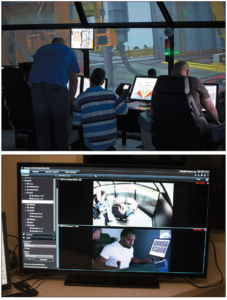Enhanced well control course integrates technical training with simulator exercises, human factors
IADC working to develop new accreditation program based on course piloted by Rowan Companies, Maersk Training
By Kelli Ainsworth, Editorial Coordinator

IADC is developing a new accreditation program for enhanced well control training that emphasizes human factors and enhanced simulation-based exercises. Between January and July of this year, Rowan Companies and Maersk Training piloted a course that could serve as a basis for this program. In the five-day course, students split their time 50/50 between the classroom and the simulator, with human factors built directly into the technical training. This helps students understand the role that non-technical skills play in their day-to-day jobs. “They’re not interested in me just standing up there and telling them theory,” said Evelyn Baldwin, Human Factors Instructor at Maersk Training. “They need to know how they can utilize this skill on the job.”
The impetus for the pilot program came out of an operational management meeting at Rowan in 2015, recalled Eliot Doyle, Global Training and Competence Manager. The company wanted to further develop the competence of employees who had well control responsibilities and decided that simulator-based training would be the right approach. Rowan then chose to partner with Maersk Training to jointly develop the training program.

In this course, students take a WellSharp driller’s level well control technical knowledge test on the first day. If passed, they earn their WellSharp certificate, and this frees students up to focus on learning, not on passing the test, for the rest of the week. “Classroom theory-based well control training is absolutely essential to be eligible for this enhanced well control,” Mr. Doyle said. “This definitely shouldn’t be the first well control class they attend. You need to fully understand well control theory before you begin the practical application training.”
In the classroom portion of the course, human factors instructors present case studies of actual well control incidents that have occurred and highlight where human factors contributed to the incident. For instance, Ms Baldwin said, she might teach the students about a decision-making model and then walk them through a scenario they might encounter on the job that requires them to apply the model. She will also relate the scenario to an actual case study, showing students where errors in decision making led to an incident. “It drives home that I’m not just making this stuff up, and these are real issues that they’re going to deal with,” she said.
When students move on to the simulator training, the instructors – who are both well control technical instructors and human factors specialists – will ensure that classroom lessons are applied. For instance, on the day the classroom lesson focuses on team leadership, the simulation exercise might include a technical instructor role-playing a company-man giving students incorrect and potentially unsafe instructions. Such a scenario tests students’ confidence and assertiveness by requiring them to step up and say the instructions are not correct.
The human factors instructors observe every simulation and debrief with the students afterwards. During this debrief session, the instructors go over what may have gone wrong during the simulation, and how students could have handled the situation differently. Maersk has two full-time human factors instructors at their Houston training facility. Both instructors – Ms Baldwin and Michele Blanton – previously worked for NASA.
Rowan employees who participated in the third pilot course, held 18-22 July at Maersk Training’s Houston facility, said they found this course more engaging than previous well control classes. “Unlike some other classes I have taken, they keep you focused here. They keep your mind on what’s taking place,” said Chris Powe, an assistant driller on the Rowan Joe Douglas jackup.
Lenny Simmons, Assistant Subsea Engineer on the Rowan Renaissance drillship, said he felt challenged by the course and hopes that the course designers will keep changing the simulation scenarios to keep students engaged. “Maybe next time we come, we could get thrown into different situations in the simulator,” he said. “They should change out the parameters every two years just to keep it new, so you’re not just going through the same class each time.”
IADC is in the process of creating an accreditation program based on the pilot courses carried out by Rowan and Maersk. “We need to come up with the rules of the road, create handbooks and create the infrastructure for us to be able to support it properly,” said Mark Denkowski, IADC Executive Vice President of Operational Integrity. The organization recognizes that when the industry recovers from the current downturn, it will be especially important to have training programs that integrate technical and human factors skills. “When we have an upturn in the industry, typically we have an upturn in incidents. That is something that we cannot have happen this time around. It’s important that people stay trained and that we and reinforce human factors.”
Mr Doyle said he supports IADC’s efforts to create this accreditation program, noting that it would help to ensure simulator-based well control/human factors training is performed consistently across the industry. “I feel really positive that IADC sees the benefit this training will provide to offshore drilling contractors ,” he added. “Some drilling contractors conduct this sort of training in-house, but an IADC standard will mean more consistency and better safety across the industry.” DC





With over 40 years in the oilfield and recently retired, due to the downturn, I think this is all about jobs for the academics, this has no relation to real time, there is no substitute for EXPERIENCE, like you use to have to acquire before you moved up the ladder, drillers with one years experience, toolpushers with 3/5 years experience is inadequate, they know nothing and they think they know everything.
Experience cannot be simulated !!!!!!